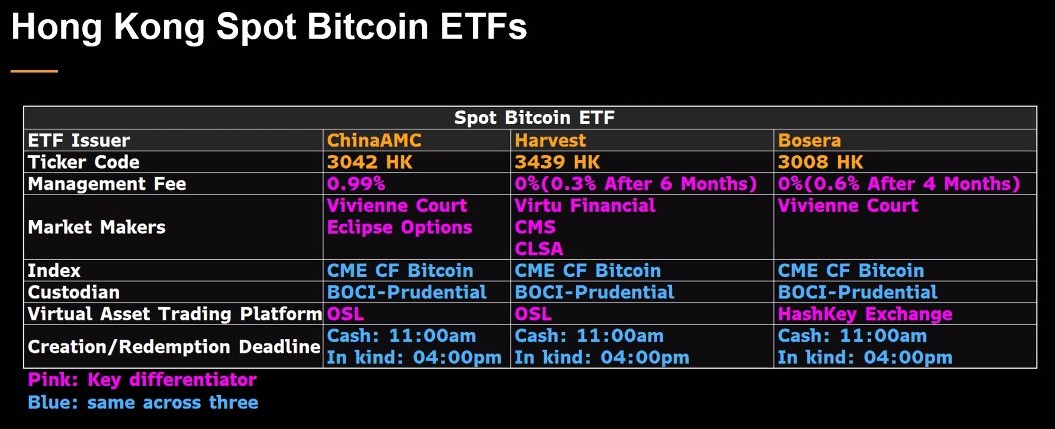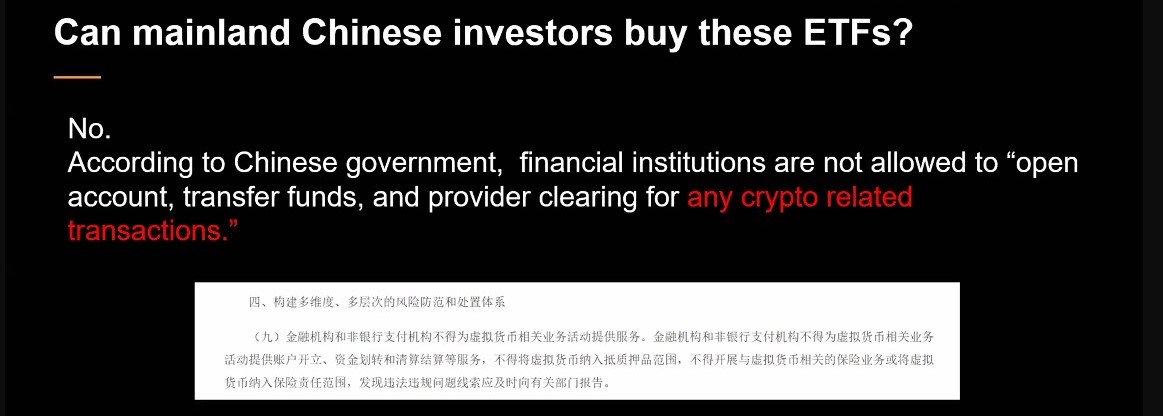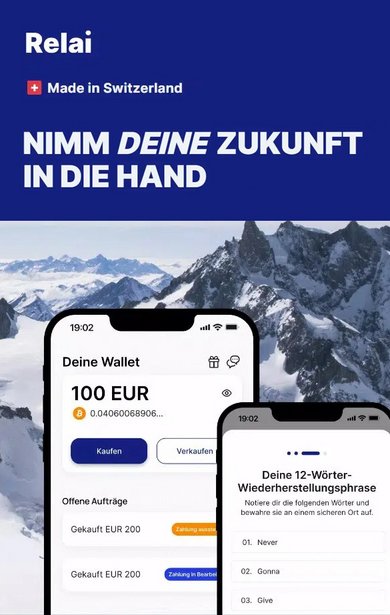Hong Kong Bitcoin ETFs to start trading as early as next week
Bitcoin and Ethereum spot ETFs will celebrate their trading launch in Hong Kong on April 30. This is according to a press release issued today by China Asset Management Company.
On April 15, the asset managers themselves announced the approval of investment products by the Hong Kong Securities and Futures Commission (SFC). However, the date of the first day of trading was still unclear, although rumors had already emerged in the past few days that it would be April 30 - which has now been confirmed.
Three Bitcoin and three Ethereum spot ETFs will therefore be tradable in Hong Kong from Tuesday next week. The fees of the ETFs are now also public and ETF experts from Bloomberg have given a classification and forecasts for the success of the new investment products in a webinar.
Fee battle
The Hong Kong subsidiary of China Asset Management Company will charge a fee of 0.99 percent. Asset managers Harvest Global Investment and Bosera Asset Management are even offering their investment products free of charge for the first few months. After six months, Harvest's Bitcoin ETF will charge a fee of 0.3 percent, which is low by Hong Kong standards. Bosera will ultimately charge 0.6 percent after four months for the investment product that the asset manager is launching with Haskey Capital.
However, the Bloomberg experts do not believe that one ETF will emerge as the clear winner due to the significant differences in fees. The reason for this is that investors in the Chinese Special Administrative Region are not very sensitive when it comes to fees, unlike those in the USA. It is even said that Hong Kongers tend to be suspicious per se if products or services are offered too cheaply in their opinion, explains Rebecca Sin, ETF expert at Bloomberg Intelligence. However, Hong Kong asset managers have probably taken a little inspiration from BlackRock and the like with their little fee battle.
In-Kind method comes to Hong Kong ETFs
It has now also been finally confirmed that the Hong Kong ETFs, unlike those from the USA, will run via the in-kind method. This means that investors can exchange their Bitcoin or Ethereum directly for ETF shares and vice versa. The advantage of this method is that anyone wishing to transfer their Bitcoin into the product does not have to sell it beforehand, which may incur taxes and fees. In addition, this method facilitates arbitrage trading, whereby the deviation from the price of the underlying asset can be minimized even further.
In the US, apparently due to money laundering concerns, only the in-cash method has been approved for the eleven Bitcoin spot ETFs tradable there. This allows more control over where the Bitcoin that ends up in the investment products comes from. Bloomberg analysts agree that Hong Kong wants to differentiate itself from the US with regard to Bitcoin spot ETFs through this small but relevant difference.
Forecasts for inflows
Even before the approval, there were already astronomical estimates of the inflows into the new Hong Kong ETFs.
The Singapore-based crypto analysis firm Matrixport assumed that the Hong Kong Bitcoin ETFs could expect demand of around 25 billion US dollars from investors in mainland China. However, they will certainly not be allowed to buy the product, as data analyst Jack Wang emphasized once again in the Bloomberg webinar.
However, as the Chinese capital market is slowly but surely opening up, Rebecca Sin holds out the prospect that the ETFs could also be tradable for mainland Chinese in 10 to 20 years.
A few days ago, Bloomberg ETF expert Eric Balchunas forecast total inflows of just USD 500 million in the optimistic case. However, Balchunas' classification was based on his assumption that fees would be between 1 and 2 percent, which did not prove to be the case.
In general, however, inflows in the high billions, as is the case in the USA, are virtually impossible due to the much smaller Hong Kong market. This is because there is more capital in the eleven Bitcoin ETFs from the US alone than in the entire Hong Kong ETF market.
Nevertheless, the Bloomberg experts are optimistic. Rebecca Sin estimates the inflows in just one month at 300 million US dollars. In the USA, the equivalent figure would be 4 to 5 billion US dollars, explains Balchunas as he categorizes this positive forecast. In the first 1 to 2 years after the launch, Jack Wang believes a billion US dollars is possible, which would mean that Bitcoin and Ethereum ETFs would account for around 2 percent of the entire Hong Kong ETF market. The experts conclude that the new investment products will have a major impact on the market in the Chinese Special Administrative Region.
Bitcoin and Ethereum futures ETFs are already authorized in Hong Kong, with a combined investment volume of around 175 million US dollars. If, as in the US, spot ETFs there also soak up many times the capital of futures ETFs, then the new ETFs could be a real success.
The volatility of Bitcoin and co. generally seems to be very popular in Asia. Rebecca Sin explains this by the fact that Asians have a preference for casinos. The Bloomberg Intelligence analyst also dares to predict that Bitcoin ETFs will soon be tradable on other exchanges in the Asia-Pacific region. First of all, she believes that investment products based on Bitcoin will soon be able to celebrate their trading launch in Korea, where she also notes people's enthusiasm for Bitcoin and Co. After that, she believes that Bitcoin spot ETFs will also come to the Australian stock exchange soon.







